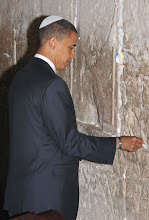 WASHINGTON – A strong secure Jewish state of Israel, supported by the United States as a close ally, has been a central feature of my public and private careers.
WASHINGTON – A strong secure Jewish state of Israel, supported by the United States as a close ally, has been a central feature of my public and private careers.As a senior government official in several administrations, an American and a Jew, I see Israel from multiple perspectives. Israel plays a strategic role in advancing American interests in the Middle East and beyond; Israel and the United States share a common set of democratic values and have developed a partnership unique in the annals of history. Israel is the Third Jewish Commonwealth, returning the Jewish people to their homeland after 2,000 years of exile, and it is the home of relatives and close friends, and the final resting place of my great-grandfather and grandfather, both of whom made aliyah.
I fervently believe President Obama’s course is essential to achieve the hopes I have for Israel’s future in the 21st century and beyond — notwithstanding the recent controversy over the president’s remarks about Israeli-Palestinian negotiations and differences over Israeli settlement expansion.
First, the Obama administration has generated unprecedented international pressure to confront Iran, Israel’s most dangerous security threat. President Obama is determined in word and deed to “prevent Iran from acquiring nuclear weapons.”
The president and Secretary of State Hillary Clinton have orchestrated increasingly biting multilateral sanctions through the U.N. Security Council, winning support even from Russia and China; strengthened them with comprehensive U.S. sanctions aimed at Iran’s financial sector; and obtained European Union support for similar sanctions.
As a result, Iran is virtually cut off from large parts of the international financial system, its economy is hobbled, and most large American and European companies have left Iran.
The administration also has taken on Islamic terrorism more generally, from gravely weakening al-Qaida with relentless drone attacks and the courageous killing of Osama bin Laden to providing vast financial and military support to help governments throughout the Middle East and North Africa combat radicalism.
Second, with bipartisan cooperation from Congress, the president has placed the military relationship with Israel at an all-time high. Israeli Prime Minister Benjamin Netanyahu recognized this in his recent speech to the American Israel Public Affairs Committee, saying that “Our security cooperation is unprecedented” and noting that the president “has backed those words up with deeds.”
President Obama has expanded U.S.-Israeli security cooperation from counterterrorism to preventing arms smuggling to Gaza to missile defense.
Despite the most difficult federal budget challenge in our lifetime, Israel’s military assistance has increased to the historic high of $3 billion. The Obama administration has assured that Israel will maintain a qualitative advantage in a region where the sophistication of arms is increasing by providing additional support of $205 million to help produce an Israeli-developed short-range rocket defense system, Iron Dome, which already has intercepted rockets from Gaza and saved Israeli lives.
Third, the Obama administration has taken head-on the insidious campaign to delegitimize Israel as a Jewish state. Obama is the first president to repeatedly refer to Israel as the “Jewish state of Israel.” He told the U.N. General Assembly that “Israel’s existence must not be a subject for debate” and said, “Efforts to chip away at Israel’s legitimacy will only be met by the unshakeable opposition of the United States.”
The president withdrew U.S. participation in the Durban Review Conference in Geneva in 2009 because of its anti-Israel agenda. And the administration strongly opposed the Goldstone report following the Gaza War.
The controversy over the president’s position on the Israeli-Palestinian peace process has colored the view of some supporters of Israel, who failed to listen to what the president said. His May 19 speech on the Arab Spring and his May 22 AIPAC speech are bookends that should be reassuring to Israeli supporters and are distinctly in Israel’s best interests.
It is critical to understand that the president was not only trying to reignite the stalled peace process, but also to head off a serious looming danger to Israel: a unilateral declaration by the U.N. General Assembly in September recognizing Palestinian statehood within pre-1967 borders, with Jerusalem as the capital of a Palestinian state and the “right of return” for Palestinian refugees.
By giving the Europeans and the G-8 members an alternative, the president’s approach gives him leverage to urge them to join him in voting against the U.N. resolution.
Without this initiative, and in the absence of a concrete Israeli proposal, the chances of heading off the U.N. vote or diminishing its support would have been nil.
Israel is politically isolated because of its government’s policies on Jewish settlements in the West Bank. The Obama initiative provides the opportunity for key nations to support the U.S. government’s determined effort to support Israel at the United Nations.
We must focus on what President Obama said and what he did not say. He emphasized that peace could not be imposed on Israel and that Israel should not be expected to negotiate with Hamas so long as it is committed to Israel’s destruction. He stated point blank that “No vote at the United Nations will ever create an independent Palestinian state,” and that any final agreement must assure that Israel can “defend itself — by itself — against any threat.” He said that the withdrawal of Israel’s military forces from the West Bank should occur only when the Palestinians can demonstrate their capacity to keep the peace, and that a Palestinian state should be “non-militarized.”
Importantly, he stressed that the status of Jerusalem and Palestinian refugees should be left to later — after negotiations on principles that satisfy each side that their respective core needs on borders and security will be met.
Finally, he said that the Palestinians must accept “Israel as a Jewish state and homeland for the Jewish people.” No American president has provided these assurances.
What he did not say was that Israel should be required to withdraw to pre-1967 borders; quite the contrary. President Obama stated clearly that negotiations should be based on “the 1967 lines with mutually agreed swaps.”
This is essentially the position that both former Israeli Prime Minister Ehud Barak at Camp David in 2000 and former Prime Minister Ehud Olmert took in 2008 in negotiations with the Palestinian Authority.
As the president stressed at AIPAC, this means “by definition” that the “parties themselves — Israelis and Palestinians — will negotiate a border that is different than the one that existed” before the Six-Day War in June 1967. That will allow the “parties themselves to account for the changes that have taken place for the last 44 years,” he said, referring to Jewish settlements in the West Bank.
Lost in the fog of an unnecessary controversy is the fact that continued expansion of settlements does not strengthen Israel’s security; it isolates Israel and makes a two-state solution more difficult.
Two states for two peoples, with as much separation as possible, is essential for Israel’s well-being. When the president said that only a viable two-state solution with Israel within internationally recognized secure borders will enable Israel to remain a majority Jewish, democratic state, the president spoke for me. I believe he spoke for millions of Israelis, too; a recent poll by Israel’s daily Maariv showed that 57 percent of Israelis accept Obama’s principles.
It’s time for the American Jewish community, and supporters of Israel in the United States and around the world, to recognize that President Obama’s broad principles — apparently just accepted by the chief Palesinitan negotiator, Saab Erekat, in a speech in a recent speech in Washington — provide the key to a safe and secure Jewish state.
(Ambassador Stuart E. Eizenstat, now a partner at the Washington law firm of Covington & Burling, served in senior positions in several presidential administrations. Under President Clinton, Eizenstat was responsible for the economic dimensions of the Middle East peace process, and he served as the administration’s special representative on Holocaust-era issues.)
Published: 22 June 2011
JTA Wire Service






